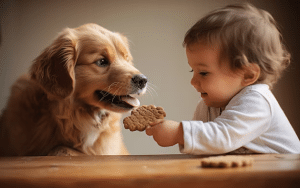When my Beagle-Lab mix, Max, snatched a few Honey Nut Cheerios (e.g., General Mills, available at Whole Foods) from my breakfast bowl, I called my Seattle-based vet, Dr. Emily Carter. She warned that while not toxic, Honey Nut Cheerios are unhealthy for dogs due to sugar and additives, offering no real benefits. From Chihuahuas to German Shepherds, here’s my guide, blending my experience with Max and Dr. Carter’s expertise, to explain why Honey Nut Cheerios should be avoided and offer better treats.
Can Dogs Eat Honey Nut Cheerios?
No, Honey Nut Cheerios are not recommended, says Dr. Carter. Their sugar (9g/100g) and sodium (190mg/100g) risk obesity and upset in Labs, with minimal nutrition. Max gets none [1].
Do Dogs Like the Taste of Honey Nut Cheerios?
Yes, many do, says Dr. Carter. The sweet, nutty flavor tempts Pugs, but it’s harmful. Max drooled but got a safer treat instead [2].
What Are the Harmful Ingredients of Honey Nut Cheerios?
Dr. Carter details (per 100g):
- Sugar: ~9g risks dental issues in Yorkies.
- Sodium: ~190mg causes thirst in Beagles.
- Corn Starch: Low risk but no benefit for Labs.
- Honey/Flavorings: Add calories (~120 kcal/100g) without nutrition.
No almonds are present; “almond flavor” is artificial. Max avoids these [3].
Can Dogs Eat Honey Nut Cheerios with Milk?
No, milk risks diarrhea in lactose-intolerant Labs, says Dr. Carter. It adds calories (~50 kcal/100ml) without benefits. Max skips milk [1].
How Much Can Honey Nut Cheerios Be Safe for the Canine?
Dr. Carter advises:
- Small Dogs (e.g., Chihuahua, 5–10 lbs): 1–2 pieces (~2g, ~2 kcal), rarely.
- Medium Dogs (e.g., Beagle, 15–39 lbs): 2–3 pieces (~3g, ~4 kcal, Max’s limit).
- Large Dogs (e.g., German Shepherd, 40+ lbs): 4–5 pieces (~5g, ~6 kcal).
More risks upset; avoid regular feeding. Max gets none [2].
Can Dogs Eat Cheerios?
Plain Cheerios are safer but unnecessary, says Dr. Carter. Low sugar (1g/100g) but high sodium (190mg/100g) offers no value for Pugs. Max skips them [3].
Can Cheerios Lead to Diarrhea in Dogs?
Yes, excess Cheerios (especially Honey Nut) may cause loose stools in Labs due to sugar or sodium, says Dr. Carter. Max had no issues with a nibble [1].
What Types of Cheerios Are Safe for Dogs?
None are ideal, says Dr. Carter. Plain Cheerios have less sugar but no nutritional benefit for Yorkies. Flavored varieties (e.g., Chocolate, Frosted) are riskier. Max gets dog treats [2].
Diseases Caused by Overconsumption of Cheerios
Dr. Carter lists:
- Obesity: Calories (~120 kcal/100g) affect Beagles.
- Dental Issues: Sugar promotes plaque in Chihuahuas.
- Digestive Upset: Sodium or sugar causes diarrhea in Pugs.
- Thirst/Urination: Sodium risks dehydration in Labs.
Seizures are unlikely without xylitol. Max stays healthy [3].
Safe and Healthy Alternatives
Dr. Carter suggests:
- Fruits: Blueberries or apples for Pugs.
- Veggies: Carrots or green beans for Labs.
- Dog Treats: Commercial options (e.g., Zuke’s, available at Petco).
Max loves carrots [1].
What to Do If Your Dog Eats Honey Nut Cheerios?
Dr. Carter’s steps for Max:
- Few Pieces: Monitor for 48 hours for diarrhea; offer water.
- Large Amount or Symptoms: Call vet or ASPCA Poison Control (888-426-4435).
- Symptoms: Watch for vomiting or lethargy (1–6 hours).
- Vet Care: May need fluids or monitoring.
Max’s nibble was safe [2].
FAQs
- Are Plain Cheerios Safe? Safer but unnecessary.
- Can Dogs Eat Honey Nut Cheerios with Milk? No, risks upset.
- Do Cheerios Cause Diarrhea? Possible if overfed.
- Are Flavored Cheerios Safe? No, too sugary.
- What If My Dog Eats Cheerios? Monitor, call vet if needed.
Key Takeaways
- Cheerios Unhealthy: High sugar and sodium.
- No Nutrition: Offer no benefits for dogs.
- Safer Treats: Fruits, veggies, or dog treats.
- Vet Guidance: Essential for dietary changes.
Final Thoughts
Max’s Cheerio snatch taught me to skip cereals, thanks to Dr. Carter’s advice. Dog owners can find Honey Nut Cheerios at Whole Foods but should avoid them for any breed, from Pomeranians to Mastiffs. Choose fruits or dog treats, monitor for upset, and consult your vet for a healthy pup!
References:
[1] PetMD, “Foods Dogs Should Avoid”.
[2] AKC, “Safe Dog Treats”.
[3] AVMA, “Pet Nutrition and Safety”.



